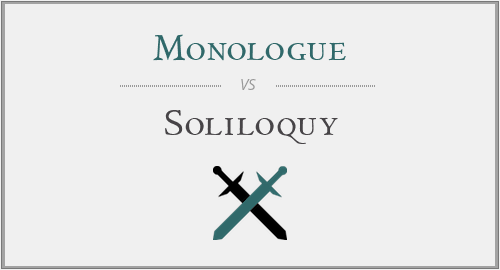There is a common confusion in English that people make between “monologue” and “soliloquy”. Some have the tendency to use one instead of the other, regardless of that fact that they actually don’t mean exactly the same things.
Mainly, yes, they do refer to similar concepts, but when it comes to formal or official writing, we have to be more exact, more accurate and careful at the words we use. So there actually is an important difference between “monologue” and “soliloquy” that you have to consider before using these into your communication. Check it below!
Monologue vs. Soliloquy
“Monologue” and “soliloquy” both refer to a speech held by only one person in front of one or more people, in front of an audience. Both concepts are used when a single person talks, without expecting an answer, addressing a dilemma, explaining something or asking rhetorical questions.
So basically both concepts start to be defined from the same concept, the opposite of dialogue, and this is the main reason why people tend to confuse these words and consider they are the same. The difference between “monologue” and “soliloquy”, anyway, is given by the context where they are used, by the conditions in which a specific speech takes place.
When do we use “monologue”?
If we were to find the perfect antonym for “dialogue”, or a great synonym for “audience-less speech”, that would be “monologue”. Monologue is defined as a long speech by one person. This can be either within a performance (a movie, a theatre piece etc.), or simply in a conversation, in front of friends or members of the family.
Example: I couldn’t say a word, all he did was having a monologue in front of me! – “monologue” refers to a long speech held by only one person, in front of one or more people.
When do we use “soliloquy”?
Now, “soliloquy” is also a type of monologue, but its definition is a little more restrictive. A “soliloquy” is a speech in a movie or in a play, where the character speaks to himself or people watching, and not to another character. So somehow, “soliloquy” is more dramatic and literary. This is a specialized noun, especially used in theatre plays, films or books, rather than when referring to a speech at a wedding or other event with friends or family.
Example: “To be or not or be” is iconic for Hamlet’s soliloquy. – “soliloquy” is a type of dramatic monologue that appears in plays or films, where a character has a long speech to himself or to the audience, not for another character.
Conclusion
To resume everything, both definitions for “monologue” and “soliloquy” start from the concept of a long speech held by one person alone. But the difference is that the first is used in any type of context, when a person talks in front of others, while the latter is a specialized noun used in literature and cinematography, in a dramatic way, referring to a speech held by a character for himself or the audience, not for the other characters.









Have a discussion about this article with the community:
Report Comment
We're doing our best to make sure our content is useful, accurate and safe.
If by any chance you spot an inappropriate comment while navigating through our website please use this form to let us know, and we'll take care of it shortly.
Attachment
You need to be logged in to favorite.
Log In